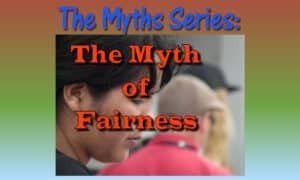Wayne C. Allen's Blog, page 6
July 28, 2024
The Myth of Limitations — The Myths Series

The Myth of Limitations — outside of physical limitations, most limitations are self imposed. So, ask yourself why that’s a good plan!
 Psst! Hey!
Psst! Hey!** Want more great writing designed to help YOU to shift your behaviour?
** Want to learn how to find, build or deepen your principal relationship?
** Want to know more about Zen living and being?
Much like the rest of the myths, limitations are self-imposed… and usually for no good reason.
I’m not talking about jumping off a ten story building and thinking I’m going to land safely.
I’m talking about what we tell ourselves about our relationships, our skills and talents, our bodies and our minds.
It’s so weird… we’re often criticized if we don’t lead with our limitationsCanadian culture for sure equates expressing positive statements about one’s strengths and abilities as bragging, or being “too wrapped up in yourself.” I suspect this is something that happens world-wide.

Many get nervous or judge‑y around successful people — like success is in limited quantities, and another’s success could mean less for me.
Others limit themselves so that others lower their expectations about them. After all, if we admit to how much talent and ability we have, someone might expect us to follow through.
So we shy away.
Years ago, as a kid, I learned from a very wise person that I should determine for myself who I was and who I wanted to be.
If I sat around listening to people tell me who to be and what to do, at best I’d be running from one thing to the next, trying to be everything to everyone. I learned that lesson well.
I’ve also learned that not everyone likes me, my opinion, talents, drive.Limitations are artificial constructs. By believing in them, you get to whine along with others about how hard done by you are.
Hey! Gather up enough whiners, and you can even elect a Ford or a Trump. I guess it’s true: misery really does love company.
To believe that we are free; that we can create, achieve, and really make a difference — this is the mark of wholeness — and of life truly lived.I would suggest that you take a moment from your reading, and note down anything that has occurred to you regarding your own limiting behaviours. Have I touched any nerves in the last few articles? What myths do you believe in?
Strange Behaviours to NoticeWe are very close to talking about solutions — but first, I like to frame what doesn’t work — it’s the way my mind works, you see.
Here are several behaviours that many engage in and which lead precisely nowhere:
Blaming –
Scott Peck, in The Road Less Traveled, differentiated between neurosis and psychosis this way:
neurotics blame themselves, and psychotics blame everyone else.
He wrote that he’d rather work with a room full of neurotics than one psychotic. Why?
The neurotic is right! The stuff we have to deal with is our responsibility. We’re not to blame, but we are responsible.
Until we’ve done the same dumb thing over and over. Then, I am not above asking how many times a person has to bash into the wall before noticing it’s there.
Blaming others is a linchpin in our society. If you still listen to the news, you will daily be bombarded with the “blame flavour” of the month. Used to be the Russians. Then Iran. Of course, all the jobs are going to immigrants. On and on.
Grown up kids blame their parents for everything. “It’s not my fault. I can’t do anything about it,” is the prevalent theme.
We hear it so much that it actually sinks in. When something goes wrong, rather than turning inside and wondering how we set life up to go the way it is going, we look around for someone to point a finger at.
The problem with this is that it means that nothing will change. It won’t change because the person doing the blaming is looking for a solution outside of him or herself.
Inertia –
Inertia is choosing to stay stuck. It happens when we decide there is nothing we can do about our lives, our problems, and the world. It is a cousin to giving up (see below), but not quite so passive — you go through the motions, but never do things differently.
Cocooning is the modern equivalent of inertia. You build your home into a fortress designed to protect you from the outside world. You take up knitting.
You fill it with comfortable things, and make your connections to the outside world through media — the Net, computer e‑mail, television. You surround yourself with sound — noise. You sit in the middle of it all and tell yourself you deserve it — you work so hard.
Boredom –
Boredom is intellectual cocooning. Your brain shuts off. Life seems monotonous and dull. Which seems to be a good thing, as, again, the blame can be placed on the world for not being stimulating enough. Or, we assume that the people around us are boring. A key expression is, “We just don’t talk any more.”
People are reduced to objects. People are judged on their ability to amuse us. People become disposable, as we look for a charge. Yet, at our depth, we know we’ll not find it. Boredom excludes the possibility of change.
Giving Up –
This is the end of the trail, just short of clinical depression. At this point, one assumes not only that nothing will change, but also that nothing can change.
Society seems to be sliding down a slippery slope to oblivion. Causes that seemed important now seem to be irrelevant. Relationships seem meaningless. Conversation is stilted, with no affect. There is no purpose.
The Way OutWell, enough of the rant about what doesn’t work.
Remember, no matter how “bad” things are, the only way your life will change is if you do.Despite all the whining about “It’s difficult — it’s challenging.” Of course it is! Waiting for “things to change” for externals to cooperate, for others to get their act together is a monumental waste of time. Things are as they are, others are as they are, and none of that is under your control.
What is under your control is how you live your life.So, let’s look at some things you can do, right now, to begin to shift yourself off of dead centre.
1. It begins with languageOK, language is key. And that’s not just semantics, he says with a grin.
Examples of silly language:“How can I get ahead? This situation is putting so much pressure on me, and the deadline is stressing me out. I’m in pain, and that’s shutting me down and depriving me of enjoyment.”“My husband is an idiot! All he ever does is misbehave, and that makes me angry. And when he makes me angry, I have no choice but to yell at him, cut him off, and demand that he change.”“My kid misbehaved, so I yelled at her. What else could I do? I have to teach her right and wrong.”Now, I hear variations of these all the time. In each case, such language comes from “ego,” which is invested in 2 things:
blaming externals, andkeeping you stuck (and therefore predictable, as your ego hates change.)The beginning of exiting this drama is to change your language so as to dis-empower your ego.
Zen, by the way, is not about eliminating the ego. It’s about learning how it works, so that you can stop doing its bidding. The ego no longer is able to pull the wool over your eyes, and you stop living under its illusions.
So,“I am choosing to see my life as I always do when I feel stuck. I am putting intense pressure on myself, and blaming the situation. I am spending so much time blaming the situation that I’m behind on a deadline, and I’m stressing myself over this. I’m dredging up painful memories that support my belief that something is happening to me, shutting myself down, and doing everything I can to deprive myself of enjoyment.“Then , “So, I’ll have a big breath, let go of the stories for a minute, and do a bit of work on the project.”“My husband is not behaving according to my fantasy, and I am making myself quite angry that he won’t live his life the way I want him to. I use anger to try to manipulate him into doing what I want, and if anger doesn’t work, I up the ante by refusing to have sex with him. Rather than work on my own life and issues, I make it “all about him,” and continually demand that he spend his life making things better for me. I never, however, consider doing the same for him.“
Then , “So, I’ll have a deep breath and tell my husband how I am upsetting myself, and then let him know what I will choose to do next.”My kid is a kid, and kids say and do ‘kid-things.’ Sometimes she doesn’t pay close attention, and stuff happens. My ego gets involved, and I lash out and yell.“
Then, “So, I’ll have a breath, and rather than yell at her, I choose to invite her to notice what she’s doing, and to come up with an alternative.”
 2. Drop the “but… it’s hard!”
2. Drop the “but… it’s hard!”This really is a follow-on for the above point.
The norm with behavioural shifting is for the ego to cleverly list off all the reasons why the shift will be either
a) hard,
b) take a long time, or
c) require someone else to do something first.
So, listen to that ego voice with compassion, have a breath, and shift something.
Remember, you learned everything you’ve learned by actually doing something. Now, we’re working on learning and enacting new behaviours to counteract what you’ve learned that does not work. This means, quite simply, that persistence, without whining, is the only way through the silliness.
3. Stop making excusesSimilarly, you’ll need to notice how quickly you excuse continuing to enact ways of doing your life that you say you want to shift. Again, notice how quickly you blame either the behaviour of others or “genetics.”
This is your crafty little ego, setting you up to stay stuck.After all, if someone else has to do something first, then you excuse yourself, and sit back and wait.
Same with genetics, only “more so.” If you think you can’t control your temper or your complaining, or whatever, because that’s what mom or dad did, again, you’re stuck, only this time, permanently. It’s convenient to try this, and with it comes the explicit or implied, “That’s just the way I am — you’ll just have to put up with it” gambit. When I try this, Darbella just laughs at me.
Stop making excuses, make another choice, and do it.Right now. Pretty soon, all that “genetic blockage” baloney will be a distant memory.
Facebook TwitterThe Myth of Limitations — The Myths Series

The Myth of Limitations — outside of physical limitations, most limitations are self imposed. So, ask yourself why that’s a good plan!
 Psst! Hey!
Psst! Hey!** Want more great writing designed to help YOU to shift your behaviour?
** Want to learn how to find, build or deepen your principal relationship?
** Want to know more about Zen living and being?
Much like the rest of the myths, limitations are self-imposed… and usually for no good reason.
I’m not talking about jumping off a ten story building and thinking I’m going to land safely.
I’m talking about what we tell ourselves about our relationships, our skills and talents, our bodies and our minds.
It’s so weird… we’re often criticized if we don’t lead with our limitationsCanadian culture for sure equates expressing positive statements about one’s strengths and abilities as bragging, or being “too wrapped up in yourself.” I suspect this is something that happens world-wide.

Many get nervous or judge‑y around successful people — like success is in limited quantities, and another’s success could mean less for me.
Others limit themselves so that others lower their expectations about them. After all, if we admit to how much talent and ability we have, someone might expect us to follow through.
So we shy away.
Years ago, as a kid, I learned from a very wise person that I should determine for myself who I was and who I wanted to be.
If I sat around listening to people tell me who to be and what to do, at best I’d be running from one thing to the next, trying to be everything to everyone. I learned that lesson well.
I’ve also learned that not everyone likes me, my opinion, talents, drive.Limitations are artificial constructs. By believing in them, you get to whine along with others about how hard done by you are.
Hey! Gather up enough whiners, and you can even elect a Ford or a Trump. I guess it’s true: misery really does love company.
To believe that we are free; that we can create, achieve, and really make a difference — this is the mark of wholeness — and of life truly lived.I would suggest that you take a moment from your reading, and note down anything that has occurred to you regarding your own limiting behaviours. Have I touched any nerves in the last few articles? What myths do you believe in?
Strange Behaviours to NoticeWe are very close to talking about solutions — but first, I like to frame what doesn’t work — it’s the way my mind works, you see.
Here are several behaviours that many engage in and which lead precisely nowhere:
Blaming –
Scott Peck, in The Road Less Traveled, differentiated between neurosis and psychosis this way:
neurotics blame themselves, and psychotics blame everyone else.
He wrote that he’d rather work with a room full of neurotics than one psychotic. Why?
The neurotic is right! The stuff we have to deal with is our responsibility. We’re not to blame, but we are responsible.
Until we’ve done the same dumb thing over and over. Then, I am not above asking how many times a person has to bash into the wall before noticing it’s there.
Blaming others is a linchpin in our society. If you still listen to the news, you will daily be bombarded with the “blame flavour” of the month. Used to be the Russians. Then Iran. Of course, all the jobs are going to immigrants. On and on.
Grown up kids blame their parents for everything. “It’s not my fault. I can’t do anything about it,” is the prevalent theme.
We hear it so much that it actually sinks in. When something goes wrong, rather than turning inside and wondering how we set life up to go the way it is going, we look around for someone to point a finger at.
The problem with this is that it means that nothing will change. It won’t change because the person doing the blaming is looking for a solution outside of him or herself.
Inertia –
Inertia is choosing to stay stuck. It happens when we decide there is nothing we can do about our lives, our problems, and the world. It is a cousin to giving up (see below), but not quite so passive — you go through the motions, but never do things differently.
Cocooning is the modern equivalent of inertia. You build your home into a fortress designed to protect you from the outside world. You take up knitting.
You fill it with comfortable things, and make your connections to the outside world through media — the Net, computer e‑mail, television. You surround yourself with sound — noise. You sit in the middle of it all and tell yourself you deserve it — you work so hard.
Boredom –
Boredom is intellectual cocooning. Your brain shuts off. Life seems monotonous and dull. Which seems to be a good thing, as, again, the blame can be placed on the world for not being stimulating enough. Or, we assume that the people around us are boring. A key expression is, “We just don’t talk any more.”
People are reduced to objects. People are judged on their ability to amuse us. People become disposable, as we look for a charge. Yet, at our depth, we know we’ll not find it. Boredom excludes the possibility of change.
Giving Up –
This is the end of the trail, just short of clinical depression. At this point, one assumes not only that nothing will change, but also that nothing can change.
Society seems to be sliding down a slippery slope to oblivion. Causes that seemed important now seem to be irrelevant. Relationships seem meaningless. Conversation is stilted, with no affect. There is no purpose.
The Way OutWell, enough of the rant about what doesn’t work.
Remember, no matter how “bad” things are, the only way your life will change is if you do.Despite all the whining about “It’s difficult — it’s challenging.” Of course it is! Waiting for “things to change” for externals to cooperate, for others to get their act together is a monumental waste of time. Things are as they are, others are as they are, and none of that is under your control.
What is under your control is how you live your life.So, let’s look at some things you can do, right now, to begin to shift yourself off of dead centre.
1. It begins with languageOK, language is key. And that’s not just semantics, he says with a grin.
Examples of silly language:“How can I get ahead? This situation is putting so much pressure on me, and the deadline is stressing me out. I’m in pain, and that’s shutting me down and depriving me of enjoyment.”“My husband is an idiot! All he ever does is misbehave, and that makes me angry. And when he makes me angry, I have no choice but to yell at him, cut him off, and demand that he change.”“My kid misbehaved, so I yelled at her. What else could I do? I have to teach her right and wrong.”Now, I hear variations of these all the time. In each case, such language comes from “ego,” which is invested in 2 things:
blaming externals, andkeeping you stuck (and therefore predictable, as your ego hates change.)The beginning of exiting this drama is to change your language so as to dis-empower your ego.
Zen, by the way, is not about eliminating the ego. It’s about learning how it works, so that you can stop doing its bidding. The ego no longer is able to pull the wool over your eyes, and you stop living under its illusions.
So,“I am choosing to see my life as I always do when I feel stuck. I am putting intense pressure on myself, and blaming the situation. I am spending so much time blaming the situation that I’m behind on a deadline, and I’m stressing myself over this. I’m dredging up painful memories that support my belief that something is happening to me, shutting myself down, and doing everything I can to deprive myself of enjoyment.“Then , “So, I’ll have a big breath, let go of the stories for a minute, and do a bit of work on the project.”“My husband is not behaving according to my fantasy, and I am making myself quite angry that he won’t live his life the way I want him to. I use anger to try to manipulate him into doing what I want, and if anger doesn’t work, I up the ante by refusing to have sex with him. Rather than work on my own life and issues, I make it “all about him,” and continually demand that he spend his life making things better for me. I never, however, consider doing the same for him.“
Then , “So, I’ll have a deep breath and tell my husband how I am upsetting myself, and then let him know what I will choose to do next.”My kid is a kid, and kids say and do ‘kid-things.’ Sometimes she doesn’t pay close attention, and stuff happens. My ego gets involved, and I lash out and yell.“
Then, “So, I’ll have a breath, and rather than yell at her, I choose to invite her to notice what she’s doing, and to come up with an alternative.”
 2. Drop the “but… it’s hard!”
2. Drop the “but… it’s hard!”This really is a follow-on for the above point.
The norm with behavioural shifting is for the ego to cleverly list off all the reasons why the shift will be either
a) hard,
b) take a long time, or
c) require someone else to do something first.
So, listen to that ego voice with compassion, have a breath, and shift something.
Remember, you learned everything you’ve learned by actually doing something. Now, we’re working on learning and enacting new behaviours to counteract what you’ve learned that does not work. This means, quite simply, that persistence, without whining, is the only way through the silliness.
3. Stop making excusesSimilarly, you’ll need to notice how quickly you excuse continuing to enact ways of doing your life that you say you want to shift. Again, notice how quickly you blame either the behaviour of others or “genetics.”
This is your crafty little ego, setting you up to stay stuck.After all, if someone else has to do something first, then you excuse yourself, and sit back and wait.
Same with genetics, only “more so.” If you think you can’t control your temper or your complaining, or whatever, because that’s what mom or dad did, again, you’re stuck, only this time, permanently. It’s convenient to try this, and with it comes the explicit or implied, “That’s just the way I am — you’ll just have to put up with it” gambit. When I try this, Darbella just laughs at me.
Stop making excuses, make another choice, and do it.Right now. Pretty soon, all that “genetic blockage” baloney will be a distant memory.
Facebook TwitterJuly 21, 2024
The Myth of Scarcity — The Myths Series

The Myth of Scarcity–when people claim something is missing in their lives, they usually mean that no one told them they’d have to work and sacrifice for it.
Of Wayne’s many books, the one closest to today’s topic is: This Endless Moment

My first and most popular book,
This Endless Moment.
Learn to live a full and satisfying life.
[image error]
It’s not worth standing in line for…
Most times when we go back to Ontario, we hope for a family gathering. We’re glad to see our niece and her brother (otherwise know as our nephew) and their respective families.
You know, they’ve turned out OK!
One thing stands out: back when they were kids and young teens, they set money aside for the things they wanted. Then… wait for it… they bought the things they wanted with money they earned; they have always taken care of themselves. Still do.
Quite unusual; most kids / teens I know assume that mom and dad are actually ATMs.Said teens sit on their butts and expect their parents to give them whatever they want. They learned this behaviour as kids–they were given whatever they wanted. Why? Parental guilt, mostly, plus some weird idea that this somehow helps the kid.
Besides, standing up to the endless requests that come with childhood is “hard” (sob, sniffle.)This starts when the is kid screaming in the candy line–and the parent buys the candy to get the kid to shut up. The parent’s choice to endlessly buy a moment’s silence contributes to producing a person who thinks they’ll get what they want by simply wanting it. And if simply wanting it isn’t enough, then they’ll whine. And if whining isn’t enough, they’ll pitch a fit, and wail that “It isn’t fair!” that they can’t have what they want.
If that doesn’t work, they’ll try to grab what they want from another.
And if that doesn’t work, they’ll turn into Trump, try to get re-elected President, and make the meeting of their wants public policy.
Such people think that not having things they didn’t earn demonstrates something external: a shortage, an unfairness, an unequal distribution of wealth–a scarcity. Of whatever.
Here’s a hint — there is no scarcity of things–there is a scarcity of self-responsibility and motivation.Most couples that seek relationship counselling declare that there is a scarcity of intimacy in their relationship. (Of course, they don’t use those words–it’s what they mean, though.) They then, loudly and at great length, describe what their partner has to do in order for there to be more intimacy.
Each feels that the other person should change. They also want their partner to stop insisting that they change–because–hey! it’s entirely the other person’s fault!
“If you loved me you’d change. You’d stop doing all the things I don’t like, and you’d stop criticizing me and accept me as I am.”And then the other person says some version of the same thing.
Never mind that this approach has never worked for them–not once. Never mind that what they are asking for is a relationship that doesn’t cost them anything. No, they declare, indignantly, they are being deprived of their just due because of the selfishness of their partner.
The belief being “pitched” is this:
“By virtue of my entitlement, because I’m so special, I deserve special treatment. I deserve to be well-thought of, I deserve to have all my needs met.”
When they put it that way, it’s no different from a kid pitching a fit in a candy line.
On the other hand, I know that, as an adult, if I want the candy, I can have it any time I want. All I have to do is earn the money to pay for it.
Now, how does this apply to personal entitlement?Entitlement: Just because I say so, I should get what I want. I will come up with “reasons.” I’ll say,
“I’m the bread-winner, so what I say goes.” or, “I’m sensitive, you can’t treat me that way,” or “Every so often I really turn ugly, and you’ll just have to put up with it.”Such behaviour paradoxically always gets the entitled person what they deserve (broken relationships.) It just never gets them what they want.
The way out, and of course there is one, is the willingness to pay for abundance .I will get out of my relationships exactly what I put in. Actually, I’ll get more than I put in–but I have to be open, accessible, curious–as opposed to expecting the other person to “behave.”
If I choose only to hang around and be in relationship with people who act the same way, I will be met with openness, accessibility and curiosity. If I want a career that I love, I have to pay whatever is due to have that career. I have to educate myself, and likely I’ll have to “work my way up.” And then there’s Magical ThinkingWhen people talk about scarcity (be it of intimacy, money, jobs, sex — whatever) what they usually mean is that what they want (as if what we want should matter) didn’t drop into their laps. Magical thinking requires that life is easy and things “just happen.” Too bad about reality intruding.

I remember once working with a woman who wanted to be an artist. She got her husband to build her a 1200-foot studio.
She never completed any projects, because she was afraid publishers wouldn’t like her work. (She was illustrating the children’s’ books she’d written.) She couldn’t understand why no one would just give her money, sight unseen, for her uncompleted work. (Entitlement # 1)
Then, she fell in lust with the carpenter who built the addition. This is when she came to see me. She was entitled, (entitlement # 2) she told me, to a deep and meaningful relationship with the carpenter (who was also married) and was entitled (# 3) to have the permission and blessing of her husband, the carpenter’s wife (# 4) and all their kids (# 5), while at the same time staying with her husband (# 6) and having him pay all the bills! (# 7)
Because, you know, she wanted (# 8) this relationship, and it was good for her (# 9), and people should understand (# 10).
I said that she could ask for all of this, but she needed to be ready for her husband to scream “NO!” as the door hit her on the backside (Reality 101).
She patiently explained to me that this would not happen, because God wanted her to have this relationship (entitlement from God) — and who was I to try to trump God?
What she wanted from me (entitlement of the “self-declared “wise”) — what she wanted was for me to do and say what she wanted me to do and say. “I need help and don’t know what to do. My life is a mess. Here is what you should say to help me.”)
I was to help her get her affirmation just right, so that she’d get what she wanted. She claimed, loud and clear, that she didn’t have a relationship problem–she had a faulty affirmation. (I’d never heard a brain called an affirmation before, but I digress.)
I fired her. From what I heard through the gossip mill, both marriages disintegrated, the lusting couple aren’t speaking and the studio is empty. But boy, she was entitled to everything — everything she got.
You can’t have something just because you want it. No, life costs. Relationships cost. They need a full-bodied commitment, 24 hours a day, 7 days a week. The price is commitment. It’s not lying to yourself, manipulating people, running around half cocked. Abundance is there, not for the taking, but for the earning.
We can have anything we are willing to pay for, in time, talent, effort and money.
What there isn’t is a free ride.
Facebook TwitterThe Myth of Scarcity — The Myths Series

The Myth of Scarcity–when people claim something is missing in their lives, they usually mean that no one told them they’d have to work and sacrifice for it.
Of Wayne’s many books, the one closest to today’s topic is: This Endless Moment

My first and most popular book,
This Endless Moment.
Learn to live a full and satisfying life.
[image error]
It’s not worth standing in line for…
Most times when we go back to Ontario, we hope for a family gathering. We’re glad to see our niece and her brother (otherwise know as our nephew) and their respective families.
You know, they’ve turned out OK!
One thing stands out: back when they were kids and young teens, they set money aside for the things they wanted. Then… wait for it… they bought the things they wanted with money they earned; they have always taken care of themselves. Still do.
Quite unusual; most kids / teens I know assume that mom and dad are actually ATMs.Said teens sit on their butts and expect their parents to give them whatever they want. They learned this behaviour as kids–they were given whatever they wanted. Why? Parental guilt, mostly, plus some weird idea that this somehow helps the kid.
Besides, standing up to the endless requests that come with childhood is “hard” (sob, sniffle.)This starts when the is kid screaming in the candy line–and the parent buys the candy to get the kid to shut up. The parent’s choice to endlessly buy a moment’s silence contributes to producing a person who thinks they’ll get what they want by simply wanting it. And if simply wanting it isn’t enough, then they’ll whine. And if whining isn’t enough, they’ll pitch a fit, and wail that “It isn’t fair!” that they can’t have what they want.
If that doesn’t work, they’ll try to grab what they want from another.
And if that doesn’t work, they’ll turn into Trump, try to get re-elected President, and make the meeting of their wants public policy.
Such people think that not having things they didn’t earn demonstrates something external: a shortage, an unfairness, an unequal distribution of wealth–a scarcity. Of whatever.
Here’s a hint — there is no scarcity of things–there is a scarcity of self-responsibility and motivation.Most couples that seek relationship counselling declare that there is a scarcity of intimacy in their relationship. (Of course, they don’t use those words–it’s what they mean, though.) They then, loudly and at great length, describe what their partner has to do in order for there to be more intimacy.
Each feels that the other person should change. They also want their partner to stop insisting that they change–because–hey! it’s entirely the other person’s fault!
“If you loved me you’d change. You’d stop doing all the things I don’t like, and you’d stop criticizing me and accept me as I am.”And then the other person says some version of the same thing.
Never mind that this approach has never worked for them–not once. Never mind that what they are asking for is a relationship that doesn’t cost them anything. No, they declare, indignantly, they are being deprived of their just due because of the selfishness of their partner.
The belief being “pitched” is this:
“By virtue of my entitlement, because I’m so special, I deserve special treatment. I deserve to be well-thought of, I deserve to have all my needs met.”
When they put it that way, it’s no different from a kid pitching a fit in a candy line.
On the other hand, I know that, as an adult, if I want the candy, I can have it any time I want. All I have to do is earn the money to pay for it.
Now, how does this apply to personal entitlement?Entitlement: Just because I say so, I should get what I want. I will come up with “reasons.” I’ll say,
“I’m the bread-winner, so what I say goes.” or, “I’m sensitive, you can’t treat me that way,” or “Every so often I really turn ugly, and you’ll just have to put up with it.”Such behaviour paradoxically always gets the entitled person what they deserve (broken relationships.) It just never gets them what they want.
The way out, and of course there is one, is the willingness to pay for abundance .I will get out of my relationships exactly what I put in. Actually, I’ll get more than I put in–but I have to be open, accessible, curious–as opposed to expecting the other person to “behave.”
If I choose only to hang around and be in relationship with people who act the same way, I will be met with openness, accessibility and curiosity. If I want a career that I love, I have to pay whatever is due to have that career. I have to educate myself, and likely I’ll have to “work my way up.” And then there’s Magical ThinkingWhen people talk about scarcity (be it of intimacy, money, jobs, sex — whatever) what they usually mean is that what they want (as if what we want should matter) didn’t drop into their laps. Magical thinking requires that life is easy and things “just happen.” Too bad about reality intruding.

I remember once working with a woman who wanted to be an artist. She got her husband to build her a 1200-foot studio.
She never completed any projects, because she was afraid publishers wouldn’t like her work. (She was illustrating the children’s’ books she’d written.) She couldn’t understand why no one would just give her money, sight unseen, for her uncompleted work. (Entitlement # 1)
Then, she fell in lust with the carpenter who built the addition. This is when she came to see me. She was entitled, (entitlement # 2) she told me, to a deep and meaningful relationship with the carpenter (who was also married) and was entitled (# 3) to have the permission and blessing of her husband, the carpenter’s wife (# 4) and all their kids (# 5), while at the same time staying with her husband (# 6) and having him pay all the bills! (# 7)
Because, you know, she wanted (# 8) this relationship, and it was good for her (# 9), and people should understand (# 10).
I said that she could ask for all of this, but she needed to be ready for her husband to scream “NO!” as the door hit her on the backside (Reality 101).
She patiently explained to me that this would not happen, because God wanted her to have this relationship (entitlement from God) — and who was I to try to trump God?
What she wanted from me (entitlement of the “self-declared “wise”) — what she wanted was for me to do and say what she wanted me to do and say. “I need help and don’t know what to do. My life is a mess. Here is what you should say to help me.”)
I was to help her get her affirmation just right, so that she’d get what she wanted. She claimed, loud and clear, that she didn’t have a relationship problem–she had a faulty affirmation. (I’d never heard a brain called an affirmation before, but I digress.)
I fired her. From what I heard through the gossip mill, both marriages disintegrated, the lusting couple aren’t speaking and the studio is empty. But boy, she was entitled to everything — everything she got.
You can’t have something just because you want it. No, life costs. Relationships cost. They need a full-bodied commitment, 24 hours a day, 7 days a week. The price is commitment. It’s not lying to yourself, manipulating people, running around half cocked. Abundance is there, not for the taking, but for the earning.
We can have anything we are willing to pay for, in time, talent, effort and money.
What there isn’t is a free ride.
Facebook TwitterJuly 14, 2024
The Myth of Easy — The Myths Series

The Myth of Easy — We have funny beliefs, and one of them is that we “ought to be” comfortable, and life ought to be easy. This tends to mean that we think others ought to move heaven and earth so that we are. Not so!
 Psst! Hey!
Psst! Hey!** Want more great writing designed to help YOU to shift your behaviour?
** Want to learn how to find, build or deepen your principal relationship?
** Want to know more about Zen living and being?
We only have to go back to the Depression and the generation after — up to and including World War II — to find the opposite of the Myth of Easy. People prior to the end of WWII would have told you quite clearly that:life is hard,there will be struggles,that simple survival was what life was all about,when tragedy struck, families rallied, and life went on.Today, the Myth of Easy says that:
nothing should be painful.There should be no lessons, other than easy ones.School should not make demands.Work should not expect excellence.Others (people we are in relationship with) should put us first.For example:
God forbid we give little Suzie the grade she deserves, or hold her back because she blew 9th grade.Never mind that she was popping pills and drinking.Never mind that she was hanging around with a group of losers.Never mind that when something went wrong, little Susie always blamed others: her failure was the fault of the teachers, the school system.No, pass her. Lest her precious little ego be damaged.
And then it’s 5 years later, and a professor at University or a boss makes a demand for work, and little Susie flips. “No one told me it was like this!”
We of the 50s and later grew up under the “Myth of Easy,” “Security” and ““Having it Better than Mom and Dad.”Remember annual raises? We got them because that’s what happened each year, not because of performance. Raises were our right, remember? And people whine because now raises might be tied to performance or some actual standard.

Personal growth was the buzzword of the 60’s. It, too, was to be easy and quick. One est weekend here, one colonic there, a chant and a mantra… and everything would be better.
If anyone suggested that enlightenment comes in fits and starts, after much effort and with painful, continued difficulties, the Cult of Easy said, “If I give you more money, can you speed up the process?”
So, now, in this seemingly endless “era of Trump” and the 1%, many are cocooned in their Lazy Boys, hoping that the pain will stop. They declare, “It wasn’t supposed to be this way.”
And then they go out and yell at people they deem to be “illegals.”
Well, baloney. As Scott Peck reminded us in The Road Less Traveled, “life is difficult.”
Learning, shifting behaviour, healing, all come at a price. No learning happens without pain.
The pain may be nothing more than the pain of having to give something — some behaviour — up, or it may be a “shaken to the foundations” type of pain, but it is a necessary component of growth.
The Cult of Easy has nothing to do with wholeness. It has to do with resisting — denying — that life is about hard, hard work.Of course, we all wish it were different, and all that wishing means that most people are stuck in one of the following “easy — comfort” loops.
 Waddaya mean I have to work on myself?Being Content vs. Being Right
Waddaya mean I have to work on myself?Being Content vs. Being RightMany folk want to be declared right. They want others to agree with their point of view. They see their mission as changing others.
This is a comfortable place, as it never involves self-reflection. It simply involves judging others and finding them lacking.
This is otherwise known as the blame game.
A minister once had a man in his congregation who was absolutely messed up. His behaviour was atrocious.
Finally, the minister decided to preach about this man.
She started off subtly, making allusions to the aberrant behaviour. Each week the man would walk up to the minister, shake her hand, and say, “That’s telling them, preacher!”
This went on week after week.
Finally, there was a snowstorm, and the only two people in church were the minister and this man. She decided to go for broke. She preached right at the man. Spelled it all out.
End of the service, she’s at the door. The man walks up, looking real sad, Grasps the minister’s hand. Says, “That’s telling them, preacher. If only they’d been here!”
Being Content — contentment — is inversely proportional to judging. The more you judge others and try to change others, the less content you are. The wise person learns that the first and greatest discipline is to focus on simply observing others, rather than trying to change them.
Manipulating others into changing If you really loved me you’d wear a shirt
If you really loved me you’d wear a shirtThis one is a second cousin to the first. It goes, “If others would change, then I could be happy.” It’s different from the first in this way.
The person does not tell the other person how to act from a position of superiority. The person wants others to change from a position of “one down.”
“If only you would see the pain you are causing in me. If you really loved me, you would change.”
People think this way because we want others to do all the work. That way, we can keep doing all sorts of silly stuff, and the other person lets us.
I had a couple for clients. He worked evenings, she worked days, and they had a one year old. She expected three things of him:
That he do the laundry, every day.That he vacuum the rugs, every day.That he polish the kitchen taps and sink, after every use.She declared that these were the rules she’d learned, and if he loved her, he’d do these things for her. Of course, there were always other items on the list; items that changed. And he was expected to watch their son.
I worked with her for some weeks, trying to help her to see that perhaps such rules were not graven in stone. She refused to budge. Finally, the husband agreed to do the three things, plus the rest of his tasks. He figured it was better than fighting.
What turned out to be our last session happened like this: He walked in. He was sick. Had been, all week. He announced that he had been too sick on Monday to do his jobs, but she’d forgiven him. He’d crawled out of bed on Tuesday, and done everything. Today, Wednesday, he’d managed to vacuum and do the laundry.
She walked in, glared at both of us, said; “I went home ahead of our session. You willfully neglected the taps and sink. The marriage is over.” And so it was.
We want to blame others for our distress. It is easy to blame, harder to take responsibility for the things that are happening in our lives.
Because of the Cult of Easy, we think others should have our best interest in mind. It is quite a shock to discover they don’t. Many people “solve” this problem by changing people. The brave few simply recognize that wholeness is not about getting others to behave themselves.
“I’m No Good!”Another variant. I had a client who would burst into tears and say, “It’s all my fault. I’m not a good person. I’m to blame.”
This is not as bad as it seems, as at least she was using the right pronoun. It is, however, a comfort-zone technique.
Feeling bad about oneself gets to be a habit, just like everything else. It requires no effort, because people who use such lines seldom conclude with — “and so here is what I am going to do differently.”
This technique allows you to sit back, tell yourself off, feel bad, sulk, maybe get some attention from those around you, and not have to change a thing.
As opposed to the truth of wholeness. “You are responsible for your life, and only you can change the way you see life, respond to others and treat your self.” You are “response able” — able to respond.
Facebook TwitterThe Myth of Easy — The Myths Series

The Myth of Easy — We have funny beliefs, and one of them is that we “ought to be” comfortable, and life ought to be easy. This tends to mean that we think others ought to move heaven and earth so that we are. Not so!
 Psst! Hey!
Psst! Hey!** Want more great writing designed to help YOU to shift your behaviour?
** Want to learn how to find, build or deepen your principal relationship?
** Want to know more about Zen living and being?
We only have to go back to the Depression and the generation after — up to and including World War II — to find the opposite of the Myth of Easy. People prior to the end of WWII would have told you quite clearly that:life is hard,there will be struggles,that simple survival was what life was all about,when tragedy struck, families rallied, and life went on.Today, the Myth of Easy says that:
nothing should be painful.There should be no lessons, other than easy ones.School should not make demands.Work should not expect excellence.Others (people we are in relationship with) should put us first.For example:
God forbid we give little Suzie the grade she deserves, or hold her back because she blew 9th grade.Never mind that she was popping pills and drinking.Never mind that she was hanging around with a group of losers.Never mind that when something went wrong, little Susie always blamed others: her failure was the fault of the teachers, the school system.No, pass her. Lest her precious little ego be damaged.
And then it’s 5 years later, and a professor at University or a boss makes a demand for work, and little Susie flips. “No one told me it was like this!”
We of the 50s and later grew up under the “Myth of Easy,” “Security” and ““Having it Better than Mom and Dad.”Remember annual raises? We got them because that’s what happened each year, not because of performance. Raises were our right, remember? And people whine because now raises might be tied to performance or some actual standard.

Personal growth was the buzzword of the 60’s. It, too, was to be easy and quick. One est weekend here, one colonic there, a chant and a mantra… and everything would be better.
If anyone suggested that enlightenment comes in fits and starts, after much effort and with painful, continued difficulties, the Cult of Easy said, “If I give you more money, can you speed up the process?”
So, now, in this seemingly endless “era of Trump” and the 1%, many are cocooned in their Lazy Boys, hoping that the pain will stop. They declare, “It wasn’t supposed to be this way.”
And then they go out and yell at people they deem to be “illegals.”
Well, baloney. As Scott Peck reminded us in The Road Less Traveled, “life is difficult.”
Learning, shifting behaviour, healing, all come at a price. No learning happens without pain.
The pain may be nothing more than the pain of having to give something — some behaviour — up, or it may be a “shaken to the foundations” type of pain, but it is a necessary component of growth.
The Cult of Easy has nothing to do with wholeness. It has to do with resisting — denying — that life is about hard, hard work.Of course, we all wish it were different, and all that wishing means that most people are stuck in one of the following “easy — comfort” loops.
 Waddaya mean I have to work on myself?Being Content vs. Being Right
Waddaya mean I have to work on myself?Being Content vs. Being RightMany folk want to be declared right. They want others to agree with their point of view. They see their mission as changing others.
This is a comfortable place, as it never involves self-reflection. It simply involves judging others and finding them lacking.
This is otherwise known as the blame game.
A minister once had a man in his congregation who was absolutely messed up. His behaviour was atrocious.
Finally, the minister decided to preach about this man.
She started off subtly, making allusions to the aberrant behaviour. Each week the man would walk up to the minister, shake her hand, and say, “That’s telling them, preacher!”
This went on week after week.
Finally, there was a snowstorm, and the only two people in church were the minister and this man. She decided to go for broke. She preached right at the man. Spelled it all out.
End of the service, she’s at the door. The man walks up, looking real sad, Grasps the minister’s hand. Says, “That’s telling them, preacher. If only they’d been here!”
Being Content — contentment — is inversely proportional to judging. The more you judge others and try to change others, the less content you are. The wise person learns that the first and greatest discipline is to focus on simply observing others, rather than trying to change them.
Manipulating others into changing If you really loved me you’d wear a shirt
If you really loved me you’d wear a shirtThis one is a second cousin to the first. It goes, “If others would change, then I could be happy.” It’s different from the first in this way.
The person does not tell the other person how to act from a position of superiority. The person wants others to change from a position of “one down.”
“If only you would see the pain you are causing in me. If you really loved me, you would change.”
People think this way because we want others to do all the work. That way, we can keep doing all sorts of silly stuff, and the other person lets us.
I had a couple for clients. He worked evenings, she worked days, and they had a one year old. She expected three things of him:
That he do the laundry, every day.That he vacuum the rugs, every day.That he polish the kitchen taps and sink, after every use.She declared that these were the rules she’d learned, and if he loved her, he’d do these things for her. Of course, there were always other items on the list; items that changed. And he was expected to watch their son.
I worked with her for some weeks, trying to help her to see that perhaps such rules were not graven in stone. She refused to budge. Finally, the husband agreed to do the three things, plus the rest of his tasks. He figured it was better than fighting.
What turned out to be our last session happened like this: He walked in. He was sick. Had been, all week. He announced that he had been too sick on Monday to do his jobs, but she’d forgiven him. He’d crawled out of bed on Tuesday, and done everything. Today, Wednesday, he’d managed to vacuum and do the laundry.
She walked in, glared at both of us, said; “I went home ahead of our session. You willfully neglected the taps and sink. The marriage is over.” And so it was.
We want to blame others for our distress. It is easy to blame, harder to take responsibility for the things that are happening in our lives.
Because of the Cult of Easy, we think others should have our best interest in mind. It is quite a shock to discover they don’t. Many people “solve” this problem by changing people. The brave few simply recognize that wholeness is not about getting others to behave themselves.
“I’m No Good!”Another variant. I had a client who would burst into tears and say, “It’s all my fault. I’m not a good person. I’m to blame.”
This is not as bad as it seems, as at least she was using the right pronoun. It is, however, a comfort-zone technique.
Feeling bad about oneself gets to be a habit, just like everything else. It requires no effort, because people who use such lines seldom conclude with — “and so here is what I am going to do differently.”
This technique allows you to sit back, tell yourself off, feel bad, sulk, maybe get some attention from those around you, and not have to change a thing.
As opposed to the truth of wholeness. “You are responsible for your life, and only you can change the way you see life, respond to others and treat your self.” You are “response able” — able to respond.
Facebook TwitterJuly 7, 2024
The Myth of No Consequences — The Myths Series

The Myth of No Consequences — the consequence, or result, is caused by the actions preceding it, 100% of the time
Of Wayne’s many books, the one closest to today’s topic is: This Endless Moment

My first and most popular book,
This Endless Moment.
Learn to live a full and satisfying life.
Briefly, one of the marks of Buddhism is its insistence on the inter-relatedness of all things. This means that no matter how unique and “singular” an event seems, it is tied into a long string of other things.
Here’s a Soto Zen Gatha that expresses this (especially in the first paragraph)First, seventy-two labors brought us this food. We should know how it comes to us.
Second, as we receive this offering, we should consider whether our virtue and practice deserve it.
Third, as we desire the natural order of mind — to be free from clinging — we must be free from greed.
Fourth, to support our life, we receive this food.
Fifth, to realize the way, we accept this food.
First, this food is for the Three Treasures.
Second, it is for our teachers, parents, nation, and all sentient beings.
Third, it is for all beings in the six worlds.
Thus, we eat this food with everyone. We eat to stop all evil, to practice good, To save all sentient beings, and to accomplish our Buddha Way.
OK, so here’s the kicker. The idea of dependent origin also applies to each of us. We are not unique, nor self-sufficient. We are the result of a long stream of genetics and choices.
First, we are the result of our genetics. We were made in the cauldron of relating and mating.Second, we have formed ourselves as a result of the choices we have made regarding events of our life, much as a potter forms a pot on a wheel. We are what we have made.We therefore are the result of the above; we have no independent being.What this means is that we are the consequence of our choices. The lump of clay who is writing this article
The lump of clay who is writing this articleLet us consider the lump of clay that is a newborn. The child is a genetic amalgam of both parents, who each are an amalgam, and back and back to when we climbed down from the trees.
Infants are hard-wired, for example, to nurse — to “latch on.” This is one of many instinctual behaviours. Some brain scientists would argue that mood and temperament are equally hard-wired in — our baseline view of the world, for example.
The rest of who we “be” is learned.
Our parents and tribes set us on a path; we — little bundles of “no-nothing” autism — are given structure, explanations, and examples. Each of these things is dictated by our culture (i.e. most of us eat what our culture or religion eats — we didn’t choose this — we absorbed it.)
Then, there are the quirks of our parents.From within the allowable parameters of each child’s culture, parents have the freedom to tilt us in particular (peculiar) directions. They promote certain aspects of our arising personalities, and block others (or at least try to.)
Because this structuring is happening to us from infancy on, we tend to believe the story we are told, and at some level, become the people our parents want us to be.
So, what about no consequences?When we are children, consequences are typically expressed in the form of punishments. “You hit your sister, you’re having a time out!”
A story: I, age 3 was at the chiropractor’s, wouldn’t stop acting up. I think I did an entire vaudeville routine. Mom, non-violent mom, warned me that there would be consequences if I didn’t stop. I didn’t.
We got home, my butt and I met the wooden spoon. Consequences.
Where this went off the rails for me is this: I never really “got” that my behaviour led to the application of the wooden spoon. I got it intellectually, but never got past the “It’s not fair!” response. To repeat:
As kids, when we were punished, we learned a skewed view of consequences . We’d break something and get sent to our room. Most kids have trouble thinking, “Gee, I broke that, and this is a fair consequence.” No, we come up with, “It’s not my fault. I didn’t know better.” Or, we go to: “They don’t love / appreciate me.”And then, because something else will always happen, we learn to lie. We blame others. “I didn’t do it, Tommy did!”If no one else is around, we’re limited to “It wasn’t me!” or “It was an accident. I shouldn’t have to pay the price of an accident!”Kids hate consequences. And most kids never grow up.Despite the wooden spoon, my upbringing was positive; I would now say overly-positive. My mom especially would intervene so I wouldn’t fail. As a result, I got all the way to University thinking I could do any dumb thing, and somehow, magically, I’d get what I wanted.
And then, because mommy wasn’t there, I started experiencing consequences. I handed in a paper late, I got a bad grade. And low and behold, my profs didn’t care if I was “supposed to” get a good grade.
I slowly started to figure out the connection between “this” and “that.” And I do mean slowly.
This “endless learning” thing is another thing that does not set well with “modern” people. So it becomes a compound problem — the game is a game of a lifetime, and where you are and who you are is about where you’ve been and what you’ve done.
Back in my counselling days, I briefly worked with a guy who was the spouse of a long-term client. He came in twice. He also had a PhD, which says something — I’m not sure what. I never had time to learn how he developed his world-view, because, only two sessions.
But his was very much the life of Peter Pan — the boy who never grew up.

He fervently believed that Never-never Land was real – that he was destined for greatness, bliss, endless great sex, and no issues — and all of this would happen with no effort on his part. All of this would happen no matter what he did.
He loudly declared that he knew for a fact that relationships were easy. All you had to do was meet the right person and there would be no problems, great sex and nothing to resolve.
I tried to help him to understand that his beliefs and behaviours were the cause of his dilemmas, but he couldn’t see it. He really believed in Never-land.
We briefly decided to talk about marriage and sex, as this was really on his mind. He was in his 50s when I saw him, and was baffled that his vision of “how things should be” did not match with “how things are.” He told me that he wasn’t happy in his marriage with my client, because “her” issues kept arising and “bad things kept happening.” Oh. And the sex was “mediocre at best.”
His marriage to my client was his fourth marriage, and he’d had several relationships on the side during all of them, and had yet to find “Ms. Perfect.”
I again tried the, “It is your beliefs that have led you to this place,” but he wasn’t buying it. Who he was and where he was was not his responsibility — he had no responsibility. All the women he chose and lived with mysteriously ended up to be somehow “wrong.”
Peter Pan-like, he left therapy, and left Canada to search the world for “the perfect relationship, which for him meant no consequences, no hassle.”
It’s all so easy — be a kid, look around, find someone to blame, and to ignore that where you are “now” is exactly and precisely where you brought yourself.
Yet doing so means remaining forever a kid. Act, get lousy results, and just keep doing that, because that’s what you do. Figure everyone ought to cut you some slack, because “That’s who I am.”
Because, of course, you are where you are by magic, or you got dragged where you are by others. “It’s not my fault!!”
Or, you can see the wisdom of dependent origin, the wisdom of consequences (my choice — my behaviour — led to this, and this leads to this…) Still confused? Let me simplify:
The consequences of your behaviour are simple to discover. The consequence of your behaviour is your life. What consequences?
What consequences?It’s oh so easy to justify ourselves to ourselves, to believe anything about ourselves, and to completely miss how we, and we alone, get ourselves into the messes we find ourselves in.
We get all dewy-eyed when we begin… whatever… and congratulate ourselves for what we have (single-handedly and perfectly, of course!) set in motion.
Then, as time goes by and the novelty wears off, and the inevitable difficulties arise, well, that’s the fault of others.
Decades ago two drunk University students climbed over a fence at the top of a mountain on their campus, this being the University of Colorado.
They went down the hill on a toboggan, despite prominent warning signs.
The fence they climbed was 8 feet high.
They crashed into a tree; one was killed the other became a quadriplegic. The survivor sued. She won. 8 million or so.
Reason? The University didn’t do “everything possible” to stop her.
I wonder if the judge expected machine gun turrets?
See, to me, here’s a couple of adults, making choices, disregarding warnings, because, hey, everyone knows they have rights!!!!!
They have the right to a drunken slide down a mountain on a toboggan. How dare the University put up signs and fences. Don’t they know they’re adults, wise in the ways of the world?
Well, spare me from the self-declared wise. They usually can’t find their ass with both hands and a map.
Then, crash. “Hey! Wait a minute! I didn’t know better. I’m just a kid. I shouldn’t be paralyzed. It’s your fault. You should have stopped me, posted a guard, tackled me and dragged me, kicking and screaming (so I could sue you for dragging me, touching me, something) from the hill.”
In other words, I expect unlimited freedom of action, and absolutely no responsibility when I screw up. And our world condones this crap.Every choice, every action, has consequences.
They are your consequences, created when you chose and/or acted. The state of your job, your relationships (all of them) your health — all of it is a consequence of your choices.
No exemptions, no excuses. And if you want to scream, “It’s not fair!” see last week’s article.
Facebook TwitterThe Myth of No Consequences — The Myths Series

The Myth of No Consequences — the consequence, or result, is caused by the actions preceding it, 100% of the time
Of Wayne’s many books, the one closest to today’s topic is: This Endless Moment

My first and most popular book,
This Endless Moment.
Learn to live a full and satisfying life.
Briefly, one of the marks of Buddhism is its insistence on the inter-relatedness of all things. This means that no matter how unique and “singular” an event seems, it is tied into a long string of other things.
Here’s a Soto Zen Gatha that expresses this (especially in the first paragraph)First, seventy-two labors brought us this food. We should know how it comes to us.
Second, as we receive this offering, we should consider whether our virtue and practice deserve it.
Third, as we desire the natural order of mind — to be free from clinging — we must be free from greed.
Fourth, to support our life, we receive this food.
Fifth, to realize the way, we accept this food.
First, this food is for the Three Treasures.
Second, it is for our teachers, parents, nation, and all sentient beings.
Third, it is for all beings in the six worlds.
Thus, we eat this food with everyone. We eat to stop all evil, to practice good, To save all sentient beings, and to accomplish our Buddha Way.
OK, so here’s the kicker. The idea of dependent origin also applies to each of us. We are not unique, nor self-sufficient. We are the result of a long stream of genetics and choices.
First, we are the result of our genetics. We were made in the cauldron of relating and mating.Second, we have formed ourselves as a result of the choices we have made regarding events of our life, much as a potter forms a pot on a wheel. We are what we have made.We therefore are the result of the above; we have no independent being.What this means is that we are the consequence of our choices. The lump of clay who is writing this article
The lump of clay who is writing this articleLet us consider the lump of clay that is a newborn. The child is a genetic amalgam of both parents, who each are an amalgam, and back and back to when we climbed down from the trees.
Infants are hard-wired, for example, to nurse — to “latch on.” This is one of many instinctual behaviours. Some brain scientists would argue that mood and temperament are equally hard-wired in — our baseline view of the world, for example.
The rest of who we “be” is learned.
Our parents and tribes set us on a path; we — little bundles of “no-nothing” autism — are given structure, explanations, and examples. Each of these things is dictated by our culture (i.e. most of us eat what our culture or religion eats — we didn’t choose this — we absorbed it.)
Then, there are the quirks of our parents.From within the allowable parameters of each child’s culture, parents have the freedom to tilt us in particular (peculiar) directions. They promote certain aspects of our arising personalities, and block others (or at least try to.)
Because this structuring is happening to us from infancy on, we tend to believe the story we are told, and at some level, become the people our parents want us to be.
So, what about no consequences?When we are children, consequences are typically expressed in the form of punishments. “You hit your sister, you’re having a time out!”
A story: I, age 3 was at the chiropractor’s, wouldn’t stop acting up. I think I did an entire vaudeville routine. Mom, non-violent mom, warned me that there would be consequences if I didn’t stop. I didn’t.
We got home, my butt and I met the wooden spoon. Consequences.
Where this went off the rails for me is this: I never really “got” that my behaviour led to the application of the wooden spoon. I got it intellectually, but never got past the “It’s not fair!” response. To repeat:
As kids, when we were punished, we learned a skewed view of consequences . We’d break something and get sent to our room. Most kids have trouble thinking, “Gee, I broke that, and this is a fair consequence.” No, we come up with, “It’s not my fault. I didn’t know better.” Or, we go to: “They don’t love / appreciate me.”And then, because something else will always happen, we learn to lie. We blame others. “I didn’t do it, Tommy did!”If no one else is around, we’re limited to “It wasn’t me!” or “It was an accident. I shouldn’t have to pay the price of an accident!”Kids hate consequences. And most kids never grow up.Despite the wooden spoon, my upbringing was positive; I would now say overly-positive. My mom especially would intervene so I wouldn’t fail. As a result, I got all the way to University thinking I could do any dumb thing, and somehow, magically, I’d get what I wanted.
And then, because mommy wasn’t there, I started experiencing consequences. I handed in a paper late, I got a bad grade. And low and behold, my profs didn’t care if I was “supposed to” get a good grade.
I slowly started to figure out the connection between “this” and “that.” And I do mean slowly.
This “endless learning” thing is another thing that does not set well with “modern” people. So it becomes a compound problem — the game is a game of a lifetime, and where you are and who you are is about where you’ve been and what you’ve done.
Back in my counselling days, I briefly worked with a guy who was the spouse of a long-term client. He came in twice. He also had a PhD, which says something — I’m not sure what. I never had time to learn how he developed his world-view, because, only two sessions.
But his was very much the life of Peter Pan — the boy who never grew up.

He fervently believed that Never-never Land was real – that he was destined for greatness, bliss, endless great sex, and no issues — and all of this would happen with no effort on his part. All of this would happen no matter what he did.
He loudly declared that he knew for a fact that relationships were easy. All you had to do was meet the right person and there would be no problems, great sex and nothing to resolve.
I tried to help him to understand that his beliefs and behaviours were the cause of his dilemmas, but he couldn’t see it. He really believed in Never-land.
We briefly decided to talk about marriage and sex, as this was really on his mind. He was in his 50s when I saw him, and was baffled that his vision of “how things should be” did not match with “how things are.” He told me that he wasn’t happy in his marriage with my client, because “her” issues kept arising and “bad things kept happening.” Oh. And the sex was “mediocre at best.”
His marriage to my client was his fourth marriage, and he’d had several relationships on the side during all of them, and had yet to find “Ms. Perfect.”
I again tried the, “It is your beliefs that have led you to this place,” but he wasn’t buying it. Who he was and where he was was not his responsibility — he had no responsibility. All the women he chose and lived with mysteriously ended up to be somehow “wrong.”
Peter Pan-like, he left therapy, and left Canada to search the world for “the perfect relationship, which for him meant no consequences, no hassle.”
It’s all so easy — be a kid, look around, find someone to blame, and to ignore that where you are “now” is exactly and precisely where you brought yourself.
Yet doing so means remaining forever a kid. Act, get lousy results, and just keep doing that, because that’s what you do. Figure everyone ought to cut you some slack, because “That’s who I am.”
Because, of course, you are where you are by magic, or you got dragged where you are by others. “It’s not my fault!!”
Or, you can see the wisdom of dependent origin, the wisdom of consequences (my choice — my behaviour — led to this, and this leads to this…) Still confused? Let me simplify:
The consequences of your behaviour are simple to discover. The consequence of your behaviour is your life. What consequences?
What consequences?It’s oh so easy to justify ourselves to ourselves, to believe anything about ourselves, and to completely miss how we, and we alone, get ourselves into the messes we find ourselves in.
We get all dewy-eyed when we begin… whatever… and congratulate ourselves for what we have (single-handedly and perfectly, of course!) set in motion.
Then, as time goes by and the novelty wears off, and the inevitable difficulties arise, well, that’s the fault of others.
Decades ago two drunk University students climbed over a fence at the top of a mountain on their campus, this being the University of Colorado.
They went down the hill on a toboggan, despite prominent warning signs.
The fence they climbed was 8 feet high.
They crashed into a tree; one was killed the other became a quadriplegic. The survivor sued. She won. 8 million or so.
Reason? The University didn’t do “everything possible” to stop her.
I wonder if the judge expected machine gun turrets?
See, to me, here’s a couple of adults, making choices, disregarding warnings, because, hey, everyone knows they have rights!!!!!
They have the right to a drunken slide down a mountain on a toboggan. How dare the University put up signs and fences. Don’t they know they’re adults, wise in the ways of the world?
Well, spare me from the self-declared wise. They usually can’t find their ass with both hands and a map.
Then, crash. “Hey! Wait a minute! I didn’t know better. I’m just a kid. I shouldn’t be paralyzed. It’s your fault. You should have stopped me, posted a guard, tackled me and dragged me, kicking and screaming (so I could sue you for dragging me, touching me, something) from the hill.”
In other words, I expect unlimited freedom of action, and absolutely no responsibility when I screw up. And our world condones this crap.Every choice, every action, has consequences.
They are your consequences, created when you chose and/or acted. The state of your job, your relationships (all of them) your health — all of it is a consequence of your choices.
No exemptions, no excuses. And if you want to scream, “It’s not fair!” see last week’s article.
Facebook TwitterJune 30, 2024
The Myth of Fairness — The Myths Series

The Myth of Fairness–getting over thinking life should be fair is, for some, a life-long task.

My first and most popular book,
This Endless Moment.
Learn to live a full and satisfying life.
If you hang around kids long enough, or if you ever were one ;-), you’ll remember hearing or speaking that phrase. When those words are uttered, it’s pretty clear that the speaker thinks that “something hasn’t worked out like it was supposed to.”
A rule, the speaker thinks, has been violated.Because of the squabbles that result over fairness, parents are known to devise elaborate ploys to preserve the illusion of fairness.
Darbella remembers this one regarding sharing while growing up with her sister. Whenever dessert was divided between them, one got to do the cutting, and the other person got to choose “which piece.” Dar describes how carefully the cutter would measure and cut, lest they give the other the “unfair” advantage of getting 1% more pie.
Because of course, everyone knows that life (and pie sharing) is supposed to be perfectly fair and absolutely equal. Aren’t I just so special???
Aren’t I just so special???A long time ago I counselled a teen; she I one of three. She declared–often and loudly–that her father loved her sister best, her mother loved her brother best, and that meant that she was left out of being “loved” best by a parent… and… wait for it… that wasn’t fair!!!
More on this one later.
So, all of this talk of fairness makes sense when we’re talking about the hurt feelings of little kids. We do what we can to soothe them, and put in time until they grow up.
Because “fair, not fair” — is how a child thinks.
At the same time, we, as adults, know that concepts such as fairness do not actually function in the real world.
Where this gets a little odd is when adults spout “fairness” as a valid model for life.Back when I was counselling, I got a call from another psychotherapist who worked in the same town. Apparently the Employee Assistance Plan we both got client referrals from had referred the same client to both of us.
We were unaware of this.
The client called my colleague and made an appointment. Then I called, and he was able to book with me sooner, so he did. I knew nothing about the other therapist.
He arrived at my office, we did a session, and at the end of the session he told me what had happened. I suggested he see the other person, since he’d booked with her first, but he decided to continue to see me.
Not a perfect scenario, but not the end of the world, either.
Anyway, he called the other therapist and cancelled his first session with her, explaining what had happened. She was not pleased.
So, she called to find out why I’d seen the guy.
I said, “He called me and we booked an appointment. At the end of his session, he mentioned he booked one with you. I suggested he see you instead of me, but he chose to continue to see me.”
She sputtered, “But … but … that’s not fair!”
I managed not to spray coffee out my nose. I said, “Hmm.” She said, “Well, at least the insurance company admitted they were wrong for referring him to both of us, and are going to pay me for the cancelled session.” I said, “Um hmm.”
She paused, she waited. I said nothing. Unsatisfied that I hadn’t made the world fair for her, she rung off.I was mostly confused as to how a therapist hadn’t figured out that the world isn’t fair.
On the other side of the “fairness” coin, friends of ours successfully brought their kids up not to expect fairness.
I remember one story when Dar, who taught with the mom, drove her and her daughter to the kid’s daycare, drop off the daughter and then carry on to school. The mom buckled the kid into the back seat, and climbed into the front.
The kid pouted and wailed, “I thought you’d sit back here with me.” The mom said she’d chosen to sit up front. The kid went, “That’s not fair!” Mom replied, “Well, life is shit and then you die.”
The kid cried, “I know!!!!”
Clearly the kid had heard that bit of wisdom before.
What’s important about that story is that, from an early age (the kid was 3 at the time) she was learning not to expect people to treat her as being special. While she is “special” as in “a unique being,” she is not “special” as in “more important that others.”
Here’s the key. When people scream, “That’s not fair!” they don’t want fairness, as in equality. They want special treatment.Back to the teen I mentioned above. She considered herself the “odd man out”–no parent loved her best.
So, what’s she really looking for?
Well, on one level she was saying, “Parents should love all their children the same.” Parents do, of course, spout that nonsense to their kids, to stop them from fighting over, “Mommy loves you best!” but parents don’t love their children the same.
They relate to each child as they perceive the kid to be–the parents’ way of dealing with each kid is the result of their own thoughts, compassion and prejudices.
What the teen really meant, and later admitted, was, “I want my parents to love me most. I don’t want to share their love with my younger siblings. I had them to myself for the year before my brother was born, and I still want their total devotion and attention.”
This helps us to unpack what “fair” means for most people and in most situations. I’m so special I’ve won prizes!!!
I’m so special I’ve won prizes!!!Fair means,
“I want to be treated as special, never have anything go wrong and always get my way. I want my needs considered before and above everyone else’s. I want all sickness, war, poverty and pestilence to stop, at least as it affects me, and I want it to stop now! My parents should be perfect, my partner perfect, my kids perfect. What I mean by perfect is that they act like I want them to, never get sick or die on me, and always strive to keep me happy. Anything less just isn’t fair.”Such thinking makes sense for a three-year-old who wants mommy in the back seat. It is a tad lame coming from a teen wanting to be an only child. It is pathetic coming from an adult who expects deferential, preferential treatment and then whines because “life is shit and then you die.”
Doesn’t matter what your justification, nor how you put it.
“My husband works all the time and won’t help with the kids. I need time for myself and he’s not pulling his weight.” Message? “It’s not fair.”
“We’re supposed to be co-parenting, and he keeps disagreeing with me, when all I want is what’s best for the kids!” Message? “It’s not fair… he should do it my way.”
Have a look at your “fairness list.” Write it out and notice how hard-done-by you feel.
Then, give yourself a shake, burn the list and decide what you’re going to do to get over the need to have more, to get your way, to be protected from life, and to be treated as special.
It won’t work, because you’re not.Facebook TwitterThe Myth of Fairness — The Myths Series

The Myth of Fairness–getting over thinking life should be fair is, for some, a life-long task.

My first and most popular book,
This Endless Moment.
Learn to live a full and satisfying life.
If you hang around kids long enough, or if you ever were one ;-), you’ll remember hearing or speaking that phrase. When those words are uttered, it’s pretty clear that the speaker thinks that “something hasn’t worked out like it was supposed to.”
A rule, the speaker thinks, has been violated.Because of the squabbles that result over fairness, parents are known to devise elaborate ploys to preserve the illusion of fairness.
Darbella remembers this one regarding sharing while growing up with her sister. Whenever dessert was divided between them, one got to do the cutting, and the other person got to choose “which piece.” Dar describes how carefully the cutter would measure and cut, lest they give the other the “unfair” advantage of getting 1% more pie.
Because of course, everyone knows that life (and pie sharing) is supposed to be perfectly fair and absolutely equal. Aren’t I just so special???
Aren’t I just so special???A long time ago I counselled a teen; she I one of three. She declared–often and loudly–that her father loved her sister best, her mother loved her brother best, and that meant that she was left out of being “loved” best by a parent… and… wait for it… that wasn’t fair!!!
More on this one later.
So, all of this talk of fairness makes sense when we’re talking about the hurt feelings of little kids. We do what we can to soothe them, and put in time until they grow up.
Because “fair, not fair” — is how a child thinks.
At the same time, we, as adults, know that concepts such as fairness do not actually function in the real world.
Where this gets a little odd is when adults spout “fairness” as a valid model for life.Back when I was counselling, I got a call from another psychotherapist who worked in the same town. Apparently the Employee Assistance Plan we both got client referrals from had referred the same client to both of us.
We were unaware of this.
The client called my colleague and made an appointment. Then I called, and he was able to book with me sooner, so he did. I knew nothing about the other therapist.
He arrived at my office, we did a session, and at the end of the session he told me what had happened. I suggested he see the other person, since he’d booked with her first, but he decided to continue to see me.
Not a perfect scenario, but not the end of the world, either.
Anyway, he called the other therapist and cancelled his first session with her, explaining what had happened. She was not pleased.
So, she called to find out why I’d seen the guy.
I said, “He called me and we booked an appointment. At the end of his session, he mentioned he booked one with you. I suggested he see you instead of me, but he chose to continue to see me.”
She sputtered, “But … but … that’s not fair!”
I managed not to spray coffee out my nose. I said, “Hmm.” She said, “Well, at least the insurance company admitted they were wrong for referring him to both of us, and are going to pay me for the cancelled session.” I said, “Um hmm.”
She paused, she waited. I said nothing. Unsatisfied that I hadn’t made the world fair for her, she rung off.I was mostly confused as to how a therapist hadn’t figured out that the world isn’t fair.
On the other side of the “fairness” coin, friends of ours successfully brought their kids up not to expect fairness.
I remember one story when Dar, who taught with the mom, drove her and her daughter to the kid’s daycare, drop off the daughter and then carry on to school. The mom buckled the kid into the back seat, and climbed into the front.
The kid pouted and wailed, “I thought you’d sit back here with me.” The mom said she’d chosen to sit up front. The kid went, “That’s not fair!” Mom replied, “Well, life is shit and then you die.”
The kid cried, “I know!!!!”
Clearly the kid had heard that bit of wisdom before.
What’s important about that story is that, from an early age (the kid was 3 at the time) she was learning not to expect people to treat her as being special. While she is “special” as in “a unique being,” she is not “special” as in “more important that others.”
Here’s the key. When people scream, “That’s not fair!” they don’t want fairness, as in equality. They want special treatment.Back to the teen I mentioned above. She considered herself the “odd man out”–no parent loved her best.
So, what’s she really looking for?
Well, on one level she was saying, “Parents should love all their children the same.” Parents do, of course, spout that nonsense to their kids, to stop them from fighting over, “Mommy loves you best!” but parents don’t love their children the same.
They relate to each child as they perceive the kid to be–the parents’ way of dealing with each kid is the result of their own thoughts, compassion and prejudices.
What the teen really meant, and later admitted, was, “I want my parents to love me most. I don’t want to share their love with my younger siblings. I had them to myself for the year before my brother was born, and I still want their total devotion and attention.”
This helps us to unpack what “fair” means for most people and in most situations. I’m so special I’ve won prizes!!!
I’m so special I’ve won prizes!!!Fair means,
“I want to be treated as special, never have anything go wrong and always get my way. I want my needs considered before and above everyone else’s. I want all sickness, war, poverty and pestilence to stop, at least as it affects me, and I want it to stop now! My parents should be perfect, my partner perfect, my kids perfect. What I mean by perfect is that they act like I want them to, never get sick or die on me, and always strive to keep me happy. Anything less just isn’t fair.”Such thinking makes sense for a three-year-old who wants mommy in the back seat. It is a tad lame coming from a teen wanting to be an only child. It is pathetic coming from an adult who expects deferential, preferential treatment and then whines because “life is shit and then you die.”
Doesn’t matter what your justification, nor how you put it.
“My husband works all the time and won’t help with the kids. I need time for myself and he’s not pulling his weight.” Message? “It’s not fair.”
“We’re supposed to be co-parenting, and he keeps disagreeing with me, when all I want is what’s best for the kids!” Message? “It’s not fair… he should do it my way.”
Have a look at your “fairness list.” Write it out and notice how hard-done-by you feel.
Then, give yourself a shake, burn the list and decide what you’re going to do to get over the need to have more, to get your way, to be protected from life, and to be treated as special.
It won’t work, because you’re not.Facebook Twitter


